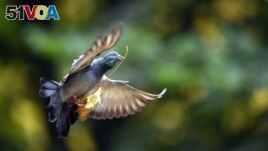08 August 2022
Waking up to a dove making cooing sounds or watching a sparrow feeding helps many people connect with nature and reduce tension.
But fewer people know that birds are also the most cost-effective way of reducing the number of pests in their garden.
Young birds love to eat insects, including aphids, whiteflies, cabbage worms and cucumber beetles.

FILE - A dove flies with a coloured leaf in Ravensburg, southern Germany, on October 13, 2015. (AFP PHOTO / DPA / FELIX KÄSTLE)
Doug Tallamy is a professor at the University of Delaware professor. He wrote the 2007 book Bringing Nature Home: How You Can Sustain Wildlife with Native Plants. He describes how a small group of chickadees, for example, could eat 6,000 to 9,000 caterpillars from birth through their first flight. That would clear out pests from any garden.
Bird-friendly environment
Jessica Damiano writes about gardening for the Associated Press. She said you do not have to be a bird expert to get pest-control effects that will help your garden. All you need to do is create a bird-friendly environment.
Damiano says the answer includes using native plants to feed native insects, which will attract hungry birds. They could be different kinds of plants that provide berries, nectar or seeds all year. The Audubon Society's Native Plants Database is an excellent source of bird-friendly plant suggestions for your area.
When food is in short supply in the cold, winter climate, leave flowering perennial plants out for birds to eat. As autumn leaves fall to the ground, place them under shrubs and trees to attract insects to feed the birds. And as the leaves break down, they will enrich the soil to give spring plants more nutrients.
Bird feeders
Set a bird feeder in the garden. Select one that comes apart for easy cleaning and that is built to keep the seeds dry. To avoid spreading diseases that can sicken birds, provide only enough seeds to last a few days, and clean feeders at least two times a month.
Choose high-quality seeds high in fat and protein, like unsalted peanuts or black-oil sunflower seeds. Migrating birds need to store calories to prepare for their end-of-season trips.
Suet is a nutritious cake made from animal fat and often mealworms, seeds or grains. It can be hung in a feeder designed to keep out other wildlife.
Place the bird feeder in a different place regularly to avoid the buildup of discarded seed shells and bird droppings on the ground.
Remember to provide the migrating birds with fresh water for bathing in a container. It should be cleaned and disinfected every week.
And avoid using chemical poisons to kill insects. They do not necessarily kill pests immediately. Insects that eat or touch the insecticide product can be eaten by birds, which can be poisoned as a result.
I'm Jill Robbins.
Jessica Damiano reported this story for the Associated Press. Hai Do adapted it for VOA Learning English.
_____________________________________________________________________
Words in This Story
pest –n. an animal or insect that causes problems for people especially by damaging crops
shrub –n. a plant that has stems of wood and is smaller than a tree
discarded –adj. something thrown away